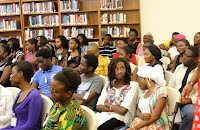To help these students have a smoother transition to American society, the Education Advising Center of the U.S. Embassy holds a pre-departure orientation for their members who have obtained admissions to various colleges in the U.S. At this year’s orientation they also had several returned Nigerian students back on summer holiday to talk to the students.
It was an interesting program and an eye opener to the outgoing students about what to expect in the U.S. Cultural Affairs Officer in the Embassy Bill Strassberger started the program by talking about the cultural differences between the U.S. and Nigeria.
The U.S. he said, has a “TO DO” culture rather than the “TO BE” culture here in Nigeria. What this means essentially is that you are recognized on your own personal merit and not that of your father, language, village etc. So when an American meets you for the first time he wants to know what you do, not who you are.
In the U.S. you need to be polite but assertive. Particularly in school, the professors (lecturers) expect students to contribute a lot to discussions. Things are also much more informal with little protocols as is obtained here in Nigeria.
There is nothing like African time in America. You must be punctual to all classes, meetings and appointments. Lateness is abhorred and regarded as rudeness. Being open and flexible will also be an asset while studying in the U.S.
Some Nigerians who studied in the U.S., as well as some who are still studying there, also contributed some tips about adjusting to life in the U.S. They include Chioma Nwonu - Smith College, Wole Aluko-Olowo – Drake University, Hadassah Nunghe – Berry College and Anthonia Anamege- Radford University.
They advised the new students going to the U.S. for the first time to plan ahead, talk to older African students in their colleges and know and interact with their professors. Wole Aluko-Olowo said they needed to carefully manage their time, especially the academic, vis-à-vis their social life and develop a schedule that works for them. Anthonia Anamege rounded it off with a strong message of “Academics first.” She told them to always remember what they are there for in the first place. The program ended with the presenters wishing the new students the best of luck in their new lives.
And from the Education Advising Center of the U.S. Embassy, we wish our outgoing students successful studies and hope they will all come back to help develop their country.




This is very encouraging. Our Children are presented with diverse but guided opportunities out there. Thank you for this insightful piece.
ReplyDeleteFranca Aiyetan